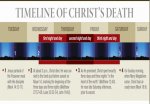During the time of the Temple, zman shechitat korban Pesach (the time of the slaughter of the Passover lambs) was performed during the afternoon hours of Nisan 14, in observance of the commandment: "In the first month, on the fourteenth day of the month, between the evenings (i.e., bein ha-arbayim: בֵּין הָעַרְבָּיִם), is the Passover for the LORD" (Lev. 23:5). Note that the time of the lamb's sacrifice is described as "bein ha-arbayim," usually translated as "between the evenings" or "between the settings." To the sages, the "first setting" of the Sun occurred at the beginning of its descent after noon, and the "second setting" referred to sundown or twilight. Hence "bein ha-arbayim" would mean sometime after noon but before twilight, or more simply, "the afternoon."
The sacrifice of the Passover lambs on the afternoon of Nisan 14 agrees with Jewish Oral Law and tradition. As Maimonides wrote, "It is a positive commandment to slaughter the Korban Pesach on the fourteenth of Nisan after midday" (Hilchot Korban Pesach). There is some discussion among the sages, however, as to whether the sacrifice of the korban Pesach occurred before or after the second set of tamid (daily) offerings made at the Temple (Exod. 29:38-42, Num. 28:1-8). In general, however, most of the sages agreed with Maimonides who clearly stated: "The Korban Pesach is not slaughtered until after the Tamid of the afternoon." In other words, the slaughter of the Passover lambs occurred on the late afternoon of Nisan 14.
Note that though the sacrifice of the Passover lamb occurred on the afternoon Nisan 14, the ceremonial eating of the meal, or the "seder," would begin later, just before sundown and continue throughout the night. This agrees with Exod. 12:8 which states clearly that the Passover meal was consumed during the night: "They shall eat the flesh [of the Pascal lamb] that night" (i.e., ba-lailah hazeh: בַּלַּיְלָה הַזֶּה). And since the Jewish day begins after sundown (when three stars are visible in the night sky), the traditional Passover Seder would begin just before sundown on Nisan 14 but would continue into the new day of Nisan 15, which is also the start of the seven-day festival of chag ha-matzot (חַג הַמַּצּוֹת), the "Feast of Unleavened Bread" (Lev. 23:6).
[TABLE="width: 637"]
[TR]
[TD="class: TextObject, width: 569, colspan: 6"]In light of all this perhaps you can better appreciate why Jewish tradition regards "Passover" as an
eight day holiday, since it links the times of the korban Pesach, the Seder meal, and the seven days of unleavened bread together as a whole.
[/TD]
[/TR]
[TR]
[TD="colspan: 7"][/TD]
[/TR]
[TR]
[TD][/TD]
[TD="class: TextObject, width: 416, colspan: 3"][/TD]
[TD="colspan: 3"][/TD]
[/TR]
[TR]
[TD="colspan: 7"][/TD]
[/TR]
[TR]
[TD][/TD]
[TD="class: TextObject, width: 568, colspan: 5"]Today the traditional Passover Seder begins on "Erev Pesach," meaning just before sundown on Nisan 14 and running into the first hours of Nisan 15 (outside of Israel a second seder is often held the following evening as well). The date of Passover can be somewhat confusing if you look at a Jewish calendar to see it listed simply as "Nisan 15." Again we must remember that the Jewish day begins on the
night before it is listed on the calendar. For example, if the calendar says that March 30th is Nisan 15 (i.e., Passover), then you must understand that Nisan 15 actually begins at sundown on the night
before,i.e., on March 29th:
Unfortunately, most Jewish calendars refer to the previous evening as "Erev Pesach" without indicating that the first "day" of Passover spans the end of Nisan 14 and carries over to Nisan 15.
In answer to our original question, then, (i.e., "Does Passover begin on Nisan 14 or Nisan 15?"), the answer is that while the Passover sacrifice was made on the afternoon of the 14th, the Passover Seder will span both the 14th and 15th! I realize all this might be a bit confusing, but it's just the way the Jewish calendar works!
Addendum:When does Passover begin?The important point in all of this, of course, is that Yeshua the is the "Lamb of God" who was sacrificed and raised from the dead according to the Scriptures (1 Cor. 15:3-5). As for the precise calculations involved in all this, including the time of His early Seder with His disciples, the exact hours of His crucifixion, and so on, there are numerous questions, though I completely trust that Yeshua 100% fulfilled the types and prophecies concerning the meaning of the Passover.
[/TD]
[/TR]
[/TABLE]

